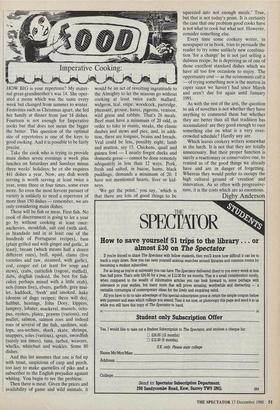Imperative Cooking:
HOW BIGBIG is your repertoire? My mater- nal great-grandmother's was 14. She oper- ated a menu which was the same every week but changed from summer to winter. Festivities such as Christmas apart, she fed her family at dinner from just 14 dishes. Fourteen is not enough for Imperative cooks but that does not mean the bigger the better. This question of the optimal size of repertoires is one of the keys to good cooking. And it is possible to be fairly precise. Take the cook who is trying to provide main dishes seven evenings a week plus lunches on Saturdays and Sundays minus three weeks' holidays; he or she requires 441 dishes a year. Now, any dish worth serving is worth serving at least twice a year, some three or four times, some even more. So even the most fervent pursuer of variety is unlikely to need a repertoire of more than 150 dishes — remember, we are only considering main dishes. These will be fish or meat. First fish. No cook of discernment is going to let a year go by without cooking at least once: anchovies, monkfish, salt cod (with aIoli, in brandade and in at least one of the hundreds of Portuguese recipes), bass (plain grilled and with ginger and garlic, at least), bream (which means half a dozen different ones), brill, squid, clams (five varieties and raw, steamed, with garlic), cod, conger eel (at least for soup and stews), crabs, cuttlefish (ragout, stuffed), dabs, dogfish (indeed, the best for fish- cakes perhaps mixed with a little crab), eels (times five), elvers, garfish, grey mul- let, haddock, 'fresh' and smoked, hake (dozens of dago recipes; three will do), halibut, herrings, John Dory, kippers, lamprey, lobster, mackerel, mussels, octo- pus, oysters, plaice, prawns (various), red mullet, salmon, salmon roes and indeed roes of several of the fish, sardines, scal- lops, sea-urchins, shark, skate, shrimps, snappers, soles (various), sprats, swordfish (surely ten times), tuna, turbot, weavers, whelks, whitebait and winkles. Some 80 dishes. And this list assumes that one is fed up with trout, suspicious of carp and perch, too lazy to make quenelles of pike and a subscriber to the English prejudice against whiting. You begin to see the problem. Then there is meat. Given the prices and availability of game and wild animals, it would be an act of revolting ingratitude to the Almighty to let the seasons go without cooking at least twice each: mallard, widgeon, teal, snipe, woodcock, partridge, pheasant, grouse, hares, pigeons, venison, wild geese and rabbits. That's 26 meals. Beef must have a minimum of 20 odd, in order to take in roasts, steaks, the classic daubes and stews and pies, and, in addi- tion, there are tongues, brains and breads. Veal could be less, possibly eight; lamb and mutton, say 15. Chickens, quail and guinea fowl — I nearly forgot ducks and domestic geese — cannot be done remotely adequately in less than 12 ways. Pork, fresh and salted, in bacon, hams, black puddings, demands a minimum of 20. I have not mentioned hearts, liver or kid- neys. 'We get the point,' you say, 'which is that there are lots of good things to be squeezed into not enough meals.' True, but that is not today's point. It is certainly the case that one problem good cooks have is not what to cook but what not. However, consider something else. Every time some cookery writer, in newspaper or in book, tries to persuade the reader to try some unlikely new combina- tion 'for a change' he is not just selling a dubious recipe, he is depriving us of one of those excellent standard dishes which we have all too few occasions to enjoy. The opportunity cost — as the economists call it — of trying something new is the mutton in caper sauce we haven't had since March and aren't due for again until January 1991. As with the rest of the arts, the question to ask of novelties is not whether they have anything to commend them but whether they are better than all that tradition has accumulated: are they good enough to oust something else on what is a very over- crowded schedule? Hardly any are. Which leaves cookery writers somewhat in the lurch. It is not that they are totally unnecessary. But their proper function is surely a reactionary or conservative one, to remind us of the good things we already have and are in danger of forgetting. Whereas they would prefer to occupy the high cultural ground of 'creation' and innovation. As so often with progressive- ness, it is the costs which are so enormous.
Digby Anderson


























































 Previous page
Previous page